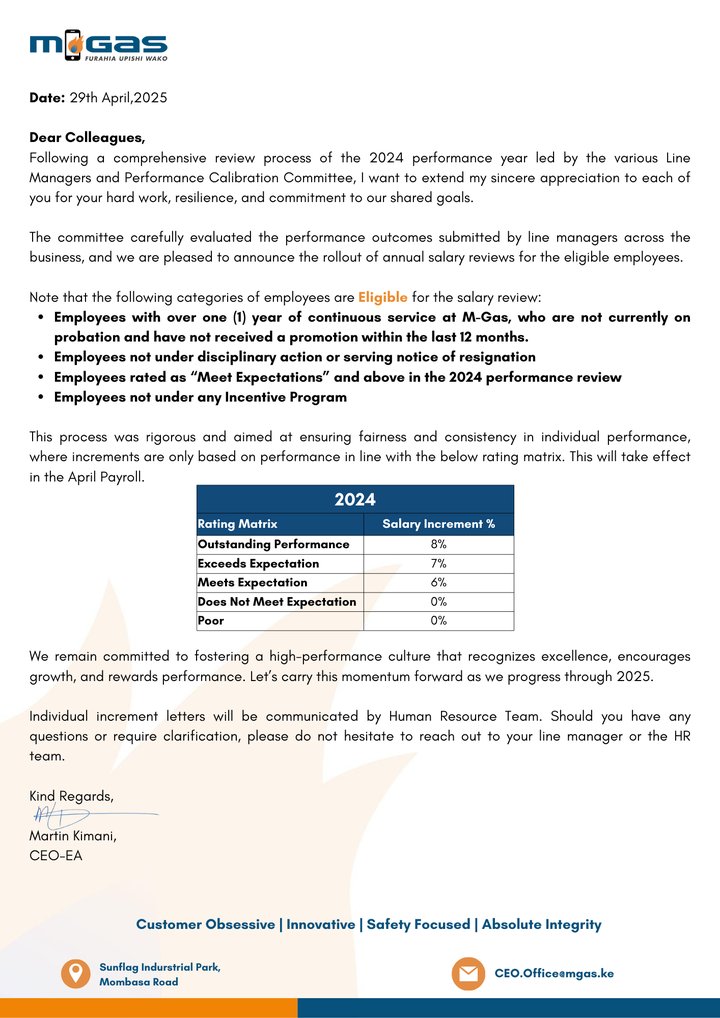At a time when the cost of living continues to surge, employees at M-Gas—a company lauded for delivering affordable energy solutions—are sounding the alarm over what they describe as a deeply flawed compensation system.
Their frustration has spilled into the public domain through prominent blogger Cyprian Nyakundi, who shared their grievances online. Workers claim that despite their growing efforts and measurable contributions, the company remains stubbornly unwilling to review base salaries.
Instead, it leans heavily on incentive schemes that many feel are both exclusionary and insufficient. Now, questions are mounting about whether M-Gas is truly valuing its workforce—or exploiting it.

Inside the M-Gas Pay Dispute and Employee Dissatisfaction
M-Gas, a well-known player in the affordable energy sector, has come under fire following claims from employees who feel increasingly sidelined by what they describe as a rigid and unresponsive salary structure.
The grievances, aired via Cyprian Nyakundi’s influential blog, paint a picture of mounting discontent at the heart of the company’s workforce.
According to the reports, employees have persistently lobbied for base salary reviews—requests that have been dismissed repeatedly by management.
Instead of addressing the need for stable and predictable income growth, M-Gas has reportedly offered performance-based incentives as a stopgap. While incentives are a common tool for boosting short-term productivity, the company’s employees argue that this approach falls woefully short of addressing their long-term financial security.
“Incentives are appreciated, yes,” one anonymous worker shared through Nyakundi’s blog, “but they should not replace fair and regular salary increases. The bonuses are tied to very high performance targets that only a small percentage of employees—less than 10%—are able to meet consistently. The rest of us, despite our hard work and dedication, see little to no tangible benefit.”
This sentiment reflects a broader issue within many corporations: the growing reliance on variable pay schemes that shift financial risk onto employees while allowing companies to keep fixed salary costs low.
Workers at M-Gas feel that their commitment and labor are being undervalued, especially considering the company’s reputation for growth and profitability in recent years.
Employee Voices Highlight Need for Fair Compensation Practices
The message relayed to Nyakundi was both heartfelt and clear. An employee wrote:
“Hello Nyakundi. I am writing in concern about the position of our company M-Gas regarding salary increases. Our persistent effort and input notwithstanding, the management has declined to increase our salaries by arguing that we are entitled to incentives. These incentives, in the view of most employees, are an inherent reward of the hard work and commitment put into the company.
They should not be a substitute for a worthy base salary review. The bonuses, as much as they are welcome, are generally tied to specific targets and do not provide the financial security of a monthly pay increase as only a few employees (less than 10%) achieve the target.
The majority of us believe that our efforts were worthy of recognition in an overhauled salary structure that rewards our commitment and effort to the company. This will be a morale booster and ensure sustained productivity.
I respectfully ask you to bring this matter to light in your blog to create awareness and stimulate a debate on ethical compensation practices. Your platform’s reach could make people aware of the need to balance incentives with rightful salary increases.”
This plea underscores the fundamental problem: without a meaningful review of base salaries, employees are left in financial limbo, despite their ongoing contributions to M-Gas’s mission.
Many now believe that fairer compensation policies are essential not just for personal well-being but also for sustaining morale and productivity across the company.

What Lies Ahead for M-Gas and Its Workforce
As these concerns gain traction online, M-Gas finds itself at a crossroads. On one hand, the company can choose to engage transparently with its employees, opening discussions around fair pay and possibly revising its compensation structures.
On the other, it risks further alienating its workforce, which could lead to deeper discontent, reduced productivity, and reputational damage. Industry experts note that while performance incentives can effectively drive short-term results, they cannot—and should not—replace the security of fair base pay.
Ethical compensation practices demand a balance that recognizes both immediate performance and sustained effort. For M-Gas, the current dispute offers an opportunity to demonstrate leadership not just in affordable energy provision but also in corporate responsibility and fairness.
So far, M-Gas has not issued a formal statement responding to these concerns. However, the growing public attention may soon force the company’s hand.
As conversations around fair labor practices intensify, all eyes will be on how M-Gas navigates this challenge—whether it will reaffirm its commitment to its employees or continue down a path that many feel is unsustainable.











































